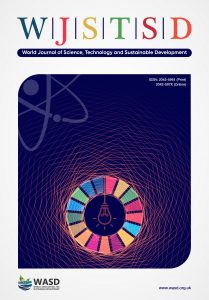On major environmental problem of desertification in Northern Nigeria with sustainable efforts to managing it, Prof. Njidda Gadzama and Prof. Haruna Ayuba
Prof. Njidda Mamadu Gadzama
Biotechnology Centre of Excellence
University of Maiduguri, Maiduguri, Borno State
Nigeria
Email: njiddagadzama@gmail.com
Prof. Haruna Kuje Ayuba
Department of Geography
Nasarawa State University, Keffi
Nigeria
DOI: 10.1108/WJSTSD-06-2015-0035
Purpose: The purpose of this paper is to show the extent of desertification and land degradation as threat to sustainable environmental, agricultural and land development in the Sahel of Nigeria with its consequences; with also some efforts to control desertification.
Design/methodology/approach: Several desertification attenuation projects in Nigeria are employing different methods for maximum benefits obtainable from the objectives) of the particular project. Specific methods will be cited for particular projects mentioned as appropriate. It is noted however that environmental impact assessment, community reconnaissance or needs assessments were initial part of pre-project activities.
Findings: Desertification has reached an alarming state in Nigeria. The frontline desert threatened States of Nigeria constitute 40 per cent of the land mass of the country. With increased pressure of desertification, exacerbated by a period of prolonged drought of about 20 years, climate change and human activities, it is becoming increasingly difficult to obtain sustainability in the management of the fragile lands and the region’s ecosystem. Strategic interventions in combating the problem of desertification in Nigeria have attenuated some of the detrimental social, economic and environmental impacts on the affected communities of the Sahel of the country. Programmes and projects are designed to strengthen the resilience of the people in the affected region with sound ecosystems’ management; support the efforts of the communities resulting in increased agricultural yields. Programmes and projects have strengthened the resilience of the people, participating in sand dune stabilization, the Great Green Wall Sahara Sahel Initiative and other shelterbelt development. Government has sustained inputs in environmentally friendly agriculture and also encouraged synergetic collaborative activities with national agencies, international agencies and local institutions.
Originality/value: These results/activities give evidence of the increased public awareness of environmental degradation due to desertification in Nigeria; the realization in environmental stabilization needs with ready participation of the communities for improved livelihoods in arid agriculture; resulting in internalization of these problems for Nigeria.
Keywords: Sustainable development; Technology adoption; Climate change; Sustainable environment; Development policies; Renewable energy.
Citation: Gadzama, N.M. and Ayuba, H.K. (2016), "On major environmental problem of desertification in Northern Nigeria with sustainable efforts to managing it", World Journal of Science, Technology and Sustainable Development, Vol. 13 No. 1, pp. 18-30. https://doi.org/10.1108/WJSTSD-06-2015-0035

